

Challenge Poverty
Project Compassion 2005 - ways schools and parishes can change the World: Pages 8 & 9
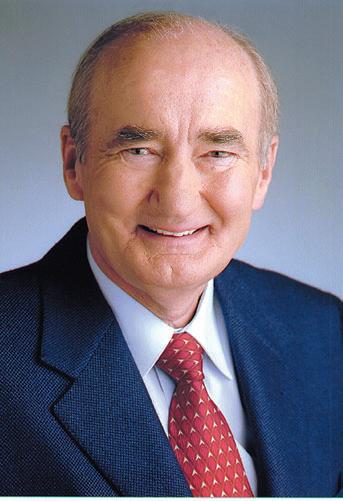
JohnHughes
Special Report:
AGAINST THE TIDE: how Perth Catholic parents are being counter-cultural by introducing their children to faith and character: Pages 12 & 13
Success through customer service
Company Philosophy
“That of a friendly and efficient company, trading with integrity and determined to give its customers the very best of service.”
How to contact discovery and The Record
Letters to the Editor cathrec@iinet.net.au
PO Box 75 Leederville, WA 6902
Administration inc. sales/subscriptions
Kylie Waddell administration@therecord.com.au PO Box 75 Leederville, WA 6902
Advertising
Carole McMillen
Eugen Mattes advertising@therecord.com.au
PO Box 75 Leederville, WA 6902
The Record 587 Newcastle St, Leederville Post: PO Box 75 Leederville, WA 6902
Tel: (08) 9227 7080
Fax: (08) 9227 7087
Journalists
Bronwen Clune clune@therecord.com.au
Jamie O'Brien jamieob@therecord.com.au
The Record on the web coming soon
discovery, circulation 68,000 copies, is published 6 times a year in school term and circulates to all families with a child in a Catholic school in Western Australia and all Catholic parishes in the state as well.
Chocolate? No, TV - our unusual Lenten fast
■ By Eric Reed“Where shall the world be found, where will the word resound? Not here, there is not enough silence.”
— TS Eliot
At my house, the TV is off. It will be until Easter. The first time this happened, it was accident, coincidence.
Some years ago, a few weeks before Easter, a burglar took some odd pieces of jewelry, a shirt my cousin gave me for Christmas, and my VCR. Worse, he took the adapter for the cable box. The antenna reception on the television was bad, so I turned it off until I could get a new adapter. I was busy with seminary and all the stuff of Easter, anyway. Holy Week was quiet that year. And moving. We staged “The
Living Last Supper” one more time, but this time it was as if I had never seen it before. Its message sank into my bones. “Is it I?” the disciples asked Jesus of his betrayer. They waited for his answer. So did I. I’m from a tradition that doesn’t give up things for Lent. In fact, we often pick up the vices others lay down (bar-b-ques on Friday, Cadbury parties).
So when I told my wife I wanted to do a penitential exercise, one corner of her mouth creased slightly. When I told her I would watch no television for six weeks, she laughed. She knows I love television. I worked in television. I programmed television. I eagerly tack onto the busiest work day a full night’s channel surfing. My wife long ago surrendered the remote to me. But, good
sport that she is, she was now willing to give up TV altogether, for my sake. I must confess nagging doubts in the days before our first intentional media blackout. I would miss March Madness. I’d have no water cooler patter to share with the Must-see crowd. Voyager might reach home without me. Everybody loves Raymond — except me. Nevertheless, after the late news on Mardi Gras night, we closed the doors on the TV cabinet and entered Lent in silence.
St John of the Cross uses the phrase “my house being now all stilled.” He refers to the stillness of his spiritual house in which the soul lives without words. In my case, the stillness must come first in a literal sense. My den is stilled before my soul is stilled. In this stilling, we

go to sleep a little earlier, we read more carefully, we talk more deeply — when we choose to talk. And we listen. The evenings are at first very long, but in the growing quiet of the passing weeks, twilight seems as a single moment with a single thought, if any thought. By Holy Week, we are ready for Christ to break our silence however he chooses:
“One of you will betray me.”
“Father, forgive them.”
“It is finished.”
If we make room by our silence, the Word will resound.
Eric Reed is editor of Leadership journal.

Australian Council of Natural Family Planning
VISITATION PARISH OF GINGIN-CHITTERING
FERTILITY CARE
A unique natural medical approach to your fertility.
We can help:
- married couples experiencing fertility difficulties or miscarriages
- women with menstrual or other women’s health problems
- couples wanting to learn about their fertility and plan their families naturally
For a confidential discussion contact Dr Amanda Lamont 9388 1334 8/10 McCourt Street, West Leederville
The Australian Centre for FertilityCare and NaProTECHNOLOGY www.fertilitycare.com.au
Natural Fertility Services
Helping Couples Achieve, Avoid and Space Pregnancies
Since 1968. Phone 1800 114 010 for a confidential appointment www.acnfp.com.au <http://www.acnfp.com.au/> perth@acnfp.com.au
Family Life Education.
(A Department of Natural Fertility Services) Fertility and Sexuality Programs:
Pre-Marriage and Marriage Enrichment Courses
Pregnancy and Breastfeeding: Antenatal / Postnatal Groups
Parenting and Education: Schools / Colleges (Primary & Secondary). Teenage Sexuality (Small Groups).
Phone 1800 114 010 to discuss your requirements
Funded by: The Catholic Archdiocese of Perth and Commonwealth Department of Health and Ageing.
Perth NFP Services 29 Victoria Square PERTH WA 6000
Tel: (08) 9223 1396, Fax: (08) 9221 3497
Feast of Our Lady of Lourdes
Sunday 13th February, 2005
Come! Join our pilgrimage to the Holy Places of the Visitation - Parish. First stop - Our Lady's Shrine - Bullsbrook, then on to lunch at Gingin 12.00 noon. 1.30 pm Holy Mass at Our Lady's Grotto, 2.30 pm depart for St Anne's Church in Bindoon for Chaplet of Divine Mercy and Benediction at 3.00 pm, this will be followed by the Blessing of the Sick and Afternoon Tea. Coaches depart Mercedes College Carpark 9.30 am sharp. To book please phone Francis Williams 9459 3873 or Mob 0404 893 877. Transport cost $14.00 per person (Return). BYO Lunch, Tea & Coffee provided. For more details phone Sheila 9575 4023 or Jean 9576 0006 or Fr Paul 9571 1839.


Catholic
A year for building something special
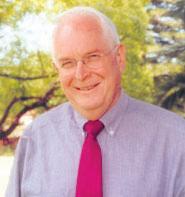
Catholic Education Director Ron Dullard welcomes back families schools, students and staff to the new school year for 2005
As we embark on the start of the school year, I would like to take the opportunity to welcome all new and returning staff, students and parents of our
Catholic schools to what is sure to be another busy and rewarding year.
During 2005, the Catholic Education Office will continue to implement the means tested Health Care Card tuition fee discount scheme (see article below) that was successfully trialled last year.
The initial response has been very positive and we look forward with much anticipation to helping ensure that no child is denied a Catholic education due to an inability to afford tuition fees.
In this, the Year of the Eucharist, let us strive to deepen our appreciation of the Eucharist as our light and strength as we go about the activities of our daily lives. I encourage school staff to continue to celebrate the Eucharist with our young people. The Catholic Education Office will also continue

to support the development of faith communities, whereby all staff, students, parents and parishes work collaboratively towards the com-
mon goal of providing the very best opportunities for our young people. By nurturing these vital partnerships, together we shall “…foster
the continuous development and improvement of Catholic schools…
In this, the Year of the Eucharist, let us strive to deepen our appreciation of the Eucharist as our light and strength as we go about the activities of our daily lives.
for the benefit of all Catholic school- aged children” as mandated by the Bishops of Western Australia. In this way, we shall continue to work towards achieving our Living the Vision call to action whereby we create environments that enhance learning, nurture our young people and empower them to live the Catholic faith in the spirit of Jesus Christ.
Catholic education from as little as $3 a week?
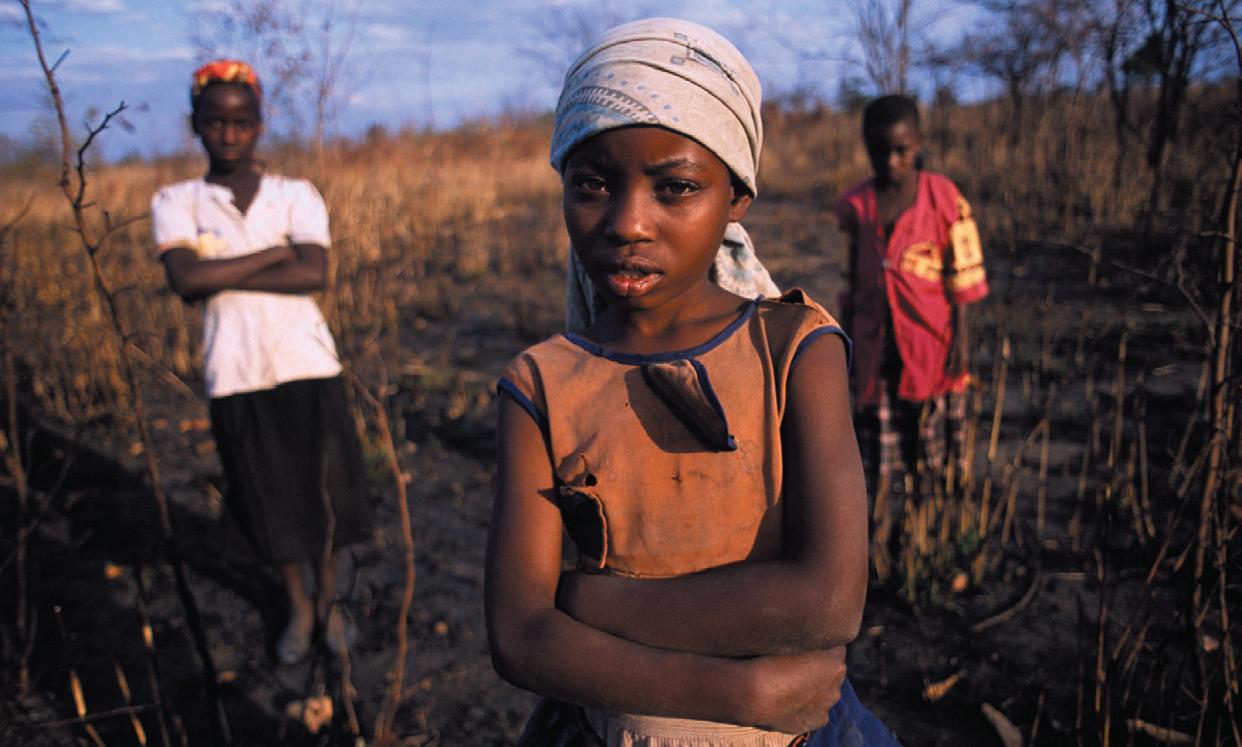
Families that hold a current means-tested Health Care Card or Parenting Payment Single Pensioner Concession Card now have access to significant tuition fee discounts at Western Australian Catholic schools and colleges under a new initiative announced by the Catholic Education Office of Western Australia.
In what is an Australian first for the non-government education sector, holders of the eligible cards will pay a tuition fee of $3 per week ($120 pa) for primary school students and $20 per week ($800 pa) for secondary school students over the 40-week school year. Currently, the average annual tuition fees at Catholic primary and secondary schools stand at $700 and $2300 respectively. Having trialled a similar scheme in two primary schools during 2004, the system-wide discounted tuition fee came into effect at the start of the new 2005 school year.
The reduced fee will be available to all families that qualify, both Catholic and non-Catholic, and will apply to current and new students.
Costs associated with specialised areas of study, excursions and general school levies may be charged in addition to the reduced tuition fee.
The enrolment of new students will be conditional upon the availability of places and subject to the criteria contained within the Catholic Education Commission of WA Student Enrolment Policy. It will not be dependent on the ability of families to pay fees.
Ron Dullard, the Director of Catholic Education in WA, said the initiative was fundamental to ensuring that no child is denied a Catholic education due to the inability to pay fees, as outlined in the Enrolment Policy.
“We would hope the initiative will act to provide greater access to Catholic education for those families with limited financial means,” he said. “The automatic qualification will also ensure that the dignity of these families is respected wholeheartedly.”
Work from home around your children and family commitments. My business is expanding and I need people to open new areas all over Australia.
Training given. Highly lucrative.
www.cyber-success-4u.org
Leaders for today
Be not afraid, Archbishop tells students
Archbishop Barry Hickey joined Mater Dei College students for part of their two-day leadership seminar on January 20-21.
Fourteen members of the student executive council and five teachers spent two days, including an overnight stay, at St Thomas More College, Crawley, in preparation for the new school year. They were continuing a tradition that began when Mater Dei opened in Edgewater in 1993.
The students were supported by Principal Clem Mulcahy, deputies Annette Morey and Jef Middelton, house coordinator Gary Byrne, and Year 12 coordinator John Cuka.
Archbishop Hickey met all the students, talked with them about matters of faith and shared the evening meal with them.
He said it was clear that they saw the link between their faith and their role as student councillors. It was their faith that made them concerned about fellow students
and gave them the values that would make them cooperative and generous young people with a sense of responsibility for others.
The Archbishop presented to the student councillors their copies of the book “Pope John Paul II speaks to youth” which they in turn will present to all Year 12 students at the College.
The book is published by Archbishop Hickey and is given exclusively each year to Year 12 students in all Catholic schools in the Archdiocese.
The Archbishop and Auxiliary Bishop Don Sproxton visit as many schools as possible to be personally associated with the presentations.
Excerpts from various speeches made by Pope John Paul to young people around the world are grouped under a dozen themes.
Archbishop Hickey discussed some of the themes with the Mater Dei students, particularly the centrality of Christ in human history and in individual lives, and his command to love and serve one another.
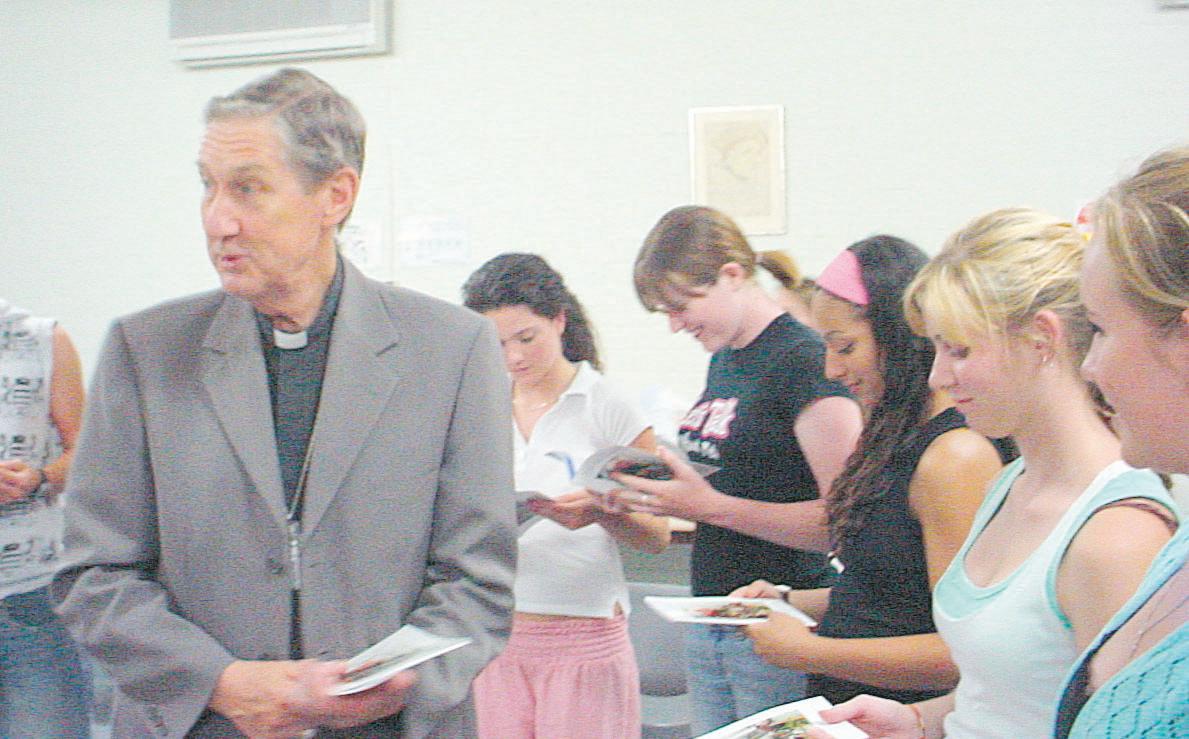
He also discussed with them the meaning of true freedom, the strength to do what is right and to oppose what is wrong.
for professional advice and legal representation:
Probate, Deceased Estates, Wills, Conveyancing, Property & Business Settlements, Leases, Commercial Property & Business law matters
Level 3, 267 St George's Tce, Perth. PH: 1300 139 680

Maranatha Institute for Adult Faith Education
Archdiocese of Perth
Catholic Education Centre 50 Ruislip Street Leederville
Do you want to:- Know more about your faith? Confirm your adult understanding of Catholic belief and practice? Take a guided tour through the Old or the New Testament? Discover the links between self-knowledge/ personal growth and prayer. If so Maranatha offers 13 complete Courses in four terms in 2005
Courses are held Tuesday and Friday
TERM 1 COURSES
Begin Tuesday 15 February and Friday 18 February
For: 7 weeks
Cost: $45
Tuesday 9.30am-12pm The Gift of the Eucharist –“Do this in Memory of Me” with Fr Vincent Glynn 1pm – 3pm The Enneagram with Sr Margaret-Anne Beech SJA
Friday 9.30am-12pm Ministry to those who Grieve with Gerry Smith
Enrolments or information phone 9212-9311 Tues. Thurs Fri. 9am-3pm. and we will send you a Course Booklet fax 9212-9382, Email: maranatha@ceo.wa.edu.au
He offered them the Pope’s personal motto “Be Not Afraid”, urging them not to be afraid to live as young Christian people, standing up for the faith and having the cour-
age to live by it even in the face of ridicule and hostility.
“I was pleased with the eager response I received from the students and with the support of the teachers, all of whom are good practising Catholics,” he said.
“I am sure the students will bring a
positive influence into the College.”
The seminar at St Thomas More included sessions on leadership, communication skills, relaxation techniques, public speaking, handling various situations, meeting structures, and preparations for Mass and other liturgies.

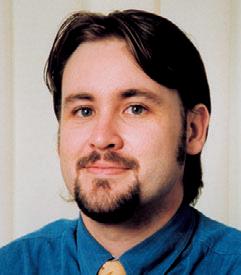
Learning from those who know less
The founder of the worldwide L’Arche communities, believes he has learned a lot from the poor and the mentally handicapped
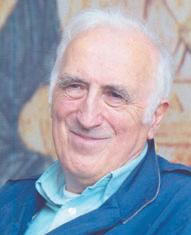
“The poor, the mentally handicapped reveal to me my own poverty and when I discover my poverty, I have greater need of God,” Jean Vernier, the founder of L’Arche (The Ark) Communities told a retreat last weekend in the Seminary of Vic, in Barcelona.
Vanier founded L’Arche in 1964, which now comprises more than 100 homes, with workshops, in 30 countries. The homes offer the mentally handicapped a chance to work and live in community.
“When I started them,” Vanier
recalled, “I wanted to show the poor how important they were by living with them.”
“Then I discovered that that was a way of the Gospel, because the poor make us live in truth,” he said. “We are all poor and condemned to death; we are all fragile, we all want to show that we are better than others. Thus, we are always fleeing from what is most important about us and we really don’t know who we are.
“Mentally handicapped people
L'Arche in Oz
L’Arche have communities here in Australia. You can find their website at http://www.larche. org.au/ while the organisation’s international website can be found at http://www.larche.org/ front/home.php You may need to click on the ‘English’ button in the top right hand corner to get the home page in English.
I the Lord Am With You Always
Prayers and Meditations for Eucharistic Adoration
Just $12 a copy


First published in 1999, this second edition contains new material and a chapter for children of First Communion and Confirmation age.
show me what my handicap is. Their violence reveals my violence. We begin to discover the truth about our inner self and then we also begin to discover the truth about God.”
“The handicapped person who accepts his handicap shows me the difficulty I have in accepting my own weaknesses, in a similar way as people who are dying, who accept their death, reveal to those who are looking after them their own fear of dying,” Vanier said.
“This is why L’Arche is a way to God - a way of the poor, because to accept Jesus we must be poor,” he continued.
“He himself, who is the beauty of the Word of God, is a great poor one, but a great poor one who accepts the strength of God. There is no Christianity if we do not discover our poverty.”
Vanier shared an observation about the recent Asian disaster.
“The collection of such a great
The Year of the Eucharist
(10th October 04 - 29th October 05)
“The Church and the world have great need of Eucharistic Worship. Jesus waits for us in the sacrament of love. Let us be generous with him in going to meet him in adoration and in contemplation that is full of faith and ready to make reparation for the great faults and crimes of the world.”
(John Paul II: Dominicae Cenae 3)
“This book ... contains a wealth of prayers, thoughts and meditations, all centred around the Real Presence of Jesus in the Blessed Sacrament ....It is a privilege for us to be able to spend time before Jesus in the Blessed Sacrament. During those precious moments we sense Jesus' tremendous love for us. We bring to Him our joys and our sorrows, we talk to Him about the needs of those around us, and we ask for that deep conversion of the heart and mind that will make us one with Him ... I commend this book to all, especially to those who have rediscovered the beauty and joy of Eucharistic adoration..." Most Rev. B. J. Hickey - Archbishop of Perth
A beautiful set of Vatican Rosary beads will be sent to all those who give an additional charity donation of $10.00 or more to help the projects of Aid to the Church in Need for the persecuted Church in Sudan*. Please tick the box below if you would like to receive the Papal Rosary beads.

amount of money for the tsunami victims shows us many things about solidarity, about the capacity of compassion of the human heart, but also about guilt,” he contended. “As we live so well and have so
many things, we cannot watch on television people who have lost everything,” the L’Arche Communities founder said.
“There is in the human being a
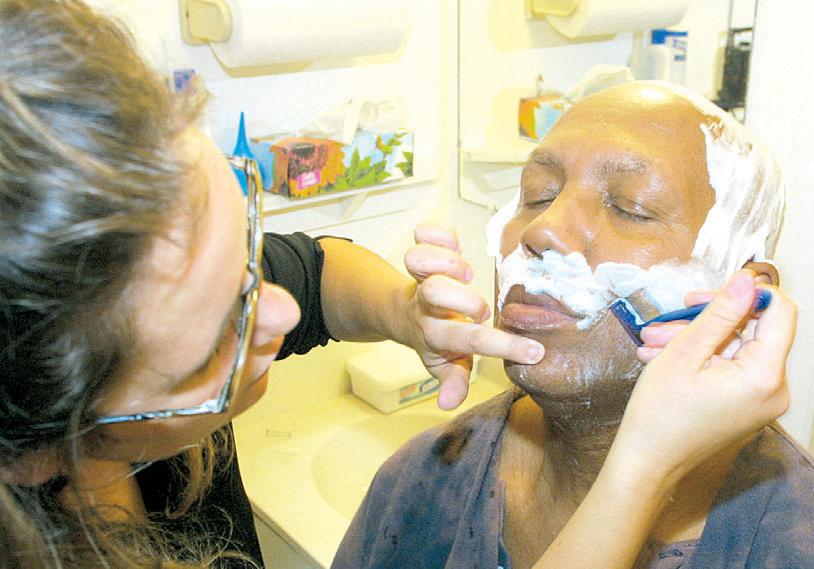

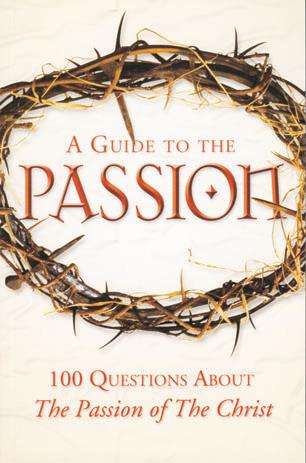

One of our best kept secrets
The L J Goody Bioethics Centre in Glendalough makes an immense contribution to Catholic students, teachers, and families in all parts of Western Australia.
Even though it is based in Perth, the Bioethics Centre serves all the dioceses of Western Australia and is consulted by bishops, clergy and hospitals in many other parts of Australia.
Founded by Archbishop Foley in March 1985, the Bioethics Centre was named in honour of a former Archbishop of Perth, Sir Launcelot Goody.
The Centre’s library is the best in Western Australia in the specialized area of health care ethics. It is available to students, teachers, doctors, nurses and university lecturers who may access the wealth of information on topics such as ethics, sexuality, marriage, moral theology, spirituality, and especially bioethics, i.e. health care ethics. It also carries journals in health care ethics and moral theology in seven different languages.
The Centre’s director is Rev. Dr Joseph Parkinson assisted by Rev. Dr Walter Black. Fr Black was the previous director of 15 years and is now semi-retired but continues on the Centre’s staff as senior consultant. Both sit on ethics committees for Catholic hospitals and the State Government.
They provide information and assistance to all members of parliament on issues concerning health

care being discussed with a view to legislation by parliament.
Many secondary school students and university students approach the Centre for copies of key articles they wish to use in completing their assignments on a whole range of issues in healthcare ethics.
They are often asked to help news-
Teenagers react against 'anything goes' society
Binge-drinking, underage sex, and misbehaviour are commonly associated with British teenagers -but young people are a lot more conservative than their elders might think, according to a report in the Guardian newspaper late last year.
It says that young people want a society that frowns on abortions, upholds the institution of marriage, takes a hard line on drugs, and punishes its criminals severely.
The information comes from a survey which found that twothirds of 5,000 teenagers aged 12 to 18 who were interviewed for Bliss magazine said they thought there were too many abortions. Seven out of 10 of the teenagers said cannabis should not be legalised. Harsher sentences for adult criminals were supported by 84 per cent, and eight out of 10 thought “bogus” asylum seekers should be sent back.
The study also found 92 per cent believed in marriage, and 60 per cent felt it was best for couples to marry before having children.
Of those who had had sex by 15, 40 per cent said they regretted the experience because they had not been ready, they were drunk, it was the wrong person, or they had felt pressured into it.
Although the teenagers expressed the desire for a stricter society, 62 per cent of 10 to 15 year-olds questioned said they had been drunk, and a quarter of 14 to 15-year olds admitted taking drugs. Almost half of those offered drugs claimed it had been at school.
Helen Johnston, the editor of Bliss, said: “Teenagers like boundaries, they make them feel safe - but over the years they’ve been torn down... This survey is a damning indictment of the damage caused by the lax attitudes of adults inflicted on children.”
paper, radio and television journalists looking for comment on topical issues.
Homebase to the Catholic Doctors Association, Catholic Association for Nurses and the Committee For Family and For Life, the Centre is also frequently used by other diocesan committees and Catholic health care organizations. The Centre also helped the Australian Catholic Bishops produce the Code of Ethical Standards for Catholic Health and Aged Care Services. This wonderful booklet is far and away the best code of health care
ethics in the English speaking world and is available for purchase from the Bioethics Centre. Lectures and seminars on the whole range of ethical issues in health care such as family planning, organ transplants, euthanasia, sex education, sterilization, abortion, drug abuse etc are provided to Catholic schools (to both students and teachers), parishes and any Christian or secular group that wishes to avail themselves of the Centre’s expertise. Many secondary school students and university students approach the Centre for copies of key articles they wish to use in completing their assignments on a whole range of issues in healthcare ethics. The Centre staff assist them either by phone contact, by facilitating their visits to the Centre and consulting both the staff and library, and by mailing specimen kits to students in schools to assist them in the range of assignments in healthcare ethics. Frequently the Centre is approached by clergy, teachers, laymen and laywomen seeking information and help in formation of conscience in the many sensitive areas which arise these days in health care, marriage and family.
Any school or parish who wish to purchase the Code of Ethical Standards for Catholic Health and Aged Care Services, or to put any other request for information or assistance to the Centre staff, can contact the Centre at 39 Jugan Street, Glendalough WA 6016. Telephone (08) 9242 4066 or email ljgbc@iinet.net.au
Scientists reveal the secret of happy babies: chocolate
DIET: Despite the sombre warnings of dieticians, we now have scientific proof that your favourite food is good for you. A Finnish study has found that expectant mothers who eat chocolate have babies who are

happier and less fearful, reports the New Scientist. Katri Raikkonen, from the University of Helsinki, says that there is an association between the amount of chocolate pregnant mothers eat and babies’ behaviour. Babies born to women who had eaten chocolate daily during pregnancy were more active and laughed and sniiled more. They also showed fewer signs of fear of new situations. However, the researchers warned that both eating chocolate and baby behaviour could be linked to some other factor. Until further studies are done - enjoy!
A tsunami a week
For Caritas a tsunami that killed more than 200,000 people across a whole section of the globe in a matter of hours was completely unexpected, but not such an unusual situation. The Australian Catholic aid agency’s normal business is dealing with poverty, development and emergency. But with tsunami-related aid work still a pressing concern, Caritas must now continue to deal with a host of other urgent problems that existed long before a tsunami struck and will likely still exist long after the tsunamis is almost forgotten. Maybe you can help through Project Compassion.
Jack de Groot cites a deadly statistic.
“In Africa alone, the tsunami’s death toll is repeated each week through conflict, and the effects of preventable illnesses such as malaria, malnutrition and lack of access to clean water,” says the national director of Caritas Australia.
Caritas is the Catholic Church’s aid and development agency in Australia.
As such, it is part of a worldwide network of Catholic agencies that are known collectively as Caritas Internationalis.
Often it is the agencies of the Caritas network that are the Church’s rapid response force to natural or manmade disasters. Worldwide, Catholic organisations like Caritas gave more than half a billion dollars after the recent tsunami devastation to help rebuild shattered lives and shattered communities.
Mr de Groot quoted the alarming statistic as he prepared to launch this year’s Project Compassion campaign, the annual appeal launched by Caritas to raise desperately-needed funds that enable Caritas’s aid workers and partner agencies around the globe to help those afflicted by disasters starvation, war, or, as most graphically demonstrated just after Christmas, a tsunami.
Project Compassion is traditionally run over the period of the Church’s year known as Lent (see Archbishop Barry Hickey’s column on Page 9). Lent always begins on Ash Wednesday, which this year is February 9.
This year Caritas faces a significant issue.
Having raised a record 12.3 million dollars in the outpouring of generosity from Australians to the tsunami victims, Caritas officials are concerned that Aussies not forget that there are many other urgent problems around the world
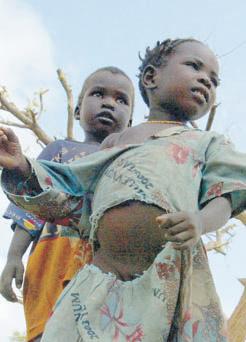


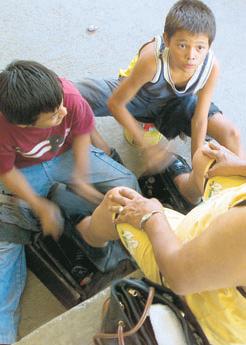


remaining to be solved. “As we move into Lent we are faced with a huge task – we must help the tsunami victims rebuild their lives and at
the same time maintain our existing work with the impoverished people we already support, Mr de Groot said.
“That is why we have a very strong call to action this year – ‘The challenge is poverty, the time is now’, he said.
“And this year, because of the tsunami, we have an additional challenge,” he said.
“People suffered terribly during
Poverty the silent killer stalking beyond the glare of the media spotlight
■ By Jamie
O’BrienCaritas Global Education adviser Janine Murphy told discovery last week that the World Health Organisation estimates that as many as 80 times as many people die from poverty each year as the recent tsunami in Asia. If the current number of people who died from the tsunami stands at 290,000,
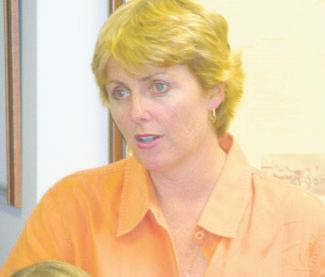
the number from poverty is as many as 23,200,000 – each year.
However, Mrs Murphy said this fact is not intended to belittle the devastation of the tsunami crises, but for people to realise that poverty is a killer.
Caritas last weekend launched its annual Project Compassion appeal and is hoping to raise as much as $8 million nationally.
In 2004 Project Compassion
raised more than $6.9 million dollars.
This year, money raised will go to projects such as improving access to education, especially for women in Cambodia, helping the people of Sudan overcome conflict and violence, assisting indigenous Australians overcome disease as well as providing
HIV/AIDS programs in El Salvador.
Mrs Murphy said she remembers a comment by U2 singer Bono, who said ‘let 2005 be a year to remember what we did do, not what we didn’t do.’
“This time of lent is the opportunity to go without, so that other people’s lives can be sustained,” Mrs Murphy
said. Perth Caritas volunteer Ralph Newton said he is encouraging people to donate to Project Compassion 90% of all donations goes towards what it was intended for.
“Caritas is also usually way ahead in terms of support for the projects it supports long before the headlines, and then also during and after,” he said.
the tsunami and with the support of those who generously made donations to Caritas Australia, we
have been able to help them,” he said.
For many years Caritas Australia has funded aid and development projects directly in the region that was affected by the tsunami.
“This put us in a very strong position when the earthquake hit. Because we already have partners and contacts in the region, we were able to ask what was needed and then get the aid out to the people who needed it most,” he explained.
“By the end of January we had already sent through $3.175 million to our partners in India, Sri Lanka, Thailand and Indonesia. This money was immediately spent on goods and services such as medicines, supply of clean drinking water, sanitation, food and shelter,” said Mr de Groot. “But during Project Compassion there will be other projects that we will need to focus on. This is because of our ongoing commitment to support other communities living in extreme poverty – in the Pacific, sub-Saharan Africa, South America and other parts of Asia that were not directly effected by the tsunami.” This year Caritas Australia is highlighting its work in six areas: Cambodia, Bougainville, the Sudan, Indigenous Australia, El Salvador and East Timor.
“I was very moved when we were doing the research for our piece on East Timor. Chief of Nefomtasa, Jose Seco, whose community was destroyed five years ago asked: ‘please don’t let Australia forget us’,” Mr de Groot said.
“And we won’t. That’s the thing about Caritas Australia. We commit long-term, so we are still there after the people are no longer in the headlines and their country is no longer making news,” he said.
“But in order to do this we need your help. We need your support for the work we are doing so that we can continue to improve the lives of
A Lenten visitor to WA
John Ashworth, an expert in Sudanese issues, is 2005’s Lenten Visitor for Caritas and will visit a number of venues in Western Australia, speaking about Sudan and promoting Project Compassion.
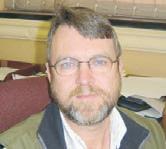
Sat 12 Feb 9.45-11am, 40a Mary St, Highgate, parking at rear off Harold St. Ph: (08) 9422 7900.
Bunbury Diocese:
Sat 12 Feb: 6pm, Mass, St Patrick’s Cathedral, Sun
Enter the spirit of Lent
The following Lenten Pastoral Letter, from ARCHBISHOP BARRY HICKEY to all Catholics in the archdiocese of Perth, looks at how Lent is a special time in the year of the Church when we can focus on becoming deeper in our faith by turning back to God.
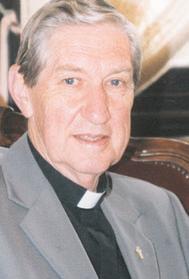

Na Rin, 37, and her family are from the village of Toul in Kompong Sam, Cambodia. In 2002 Caritas listened to villagers' concerns and assisted them to build a road and bridge to make it easier to take produce to market, and installed hand pumps so families such as Na Rin's could have access to clean, safe, drinking water.
those who live in poverty,” he said. Caritas has one of the lowest administration costs of any aid agency in the world.
“At least 92 cents in every dollar donated to Caritas Australia for an emergency such as the Asia Earthquake Appeal goes to the people on the ground who need it. The other eight cents is spent on accounting and monitoring to ensure that the money is spent the way our donors expect it to be spent.
“In the case of Project Compassion, at least 90% of donated funds will go to development work. The remaining 10% is used for administration fundraising,” he said.
13 Feb: 7.30am, Mass, St Patrick’s Cathedral; 8.30am, Mass, St Thomas’s, Carey Park; 9.30am, Mass, St Mary’s, South Bunbury; 6pm, St Patrick’s Cathedral.
Geraldton Diocese:
Sat 19 Feb: 6pm, Mass, Perenjori; Sun 20 Feb: 8am Mass Coorow; 10am Mass, Three Springs; 6pm Mass, Mingenew.
Tuesday 22 Feb: Spirituality in the Pub, Elephant & Wheelbarrow, cnr Lake & Francis streets, Northbridge, 7.30-9.10pm.
Sunday 27 Feb: 4-7pm Redemptorist Monastery, North Perth.
Penance and self-control are essential to the Christian life. We need to ask for God’s mercy and forgiveness for our sins. The need for conversion, and for most of us ongoing conversion, is obvious. It was the meaning behind the baptism of John - “Repent, for the Kingdom of heaven is near”. (Mt.3,2) St John the Baptist knew that only those who repented of their sins and turned back to God would be open to the coming of the Redeemer.
For those who regularly attend Mass and seek to live a good life according to the Gospel a radical conversion is not required or even possible because one has already chosen to follow Christ. At the same time the recognition that one continually falls into the same sins of pride, selfishness, lust, unkind criticism of others and dishonesty requires of us constant conversion in order to grow in holiness.
Ash Wednesday and the time of Lent afford an ideal opportunity for us to redirect our lives and our energies towards a rejection of sin and a renewed commitment to follow Christ more closely through a life of love and forgiveness of others.
For some a radical conversion is necessary. Please God some will receive the grace this Lent to abandon their sinful way of life that will lead inexorably to spiritual destruction and to receive the peace and love to be found in God’s kingdom.
The ashes used on Ash Wednesday come from the palms of Palm Sunday. The two events are linked. They come at the beginning and end of Lent, giving way to the greatest week of the Church’s year, Holy Week, and the Feast of Easter, the rising of Christ from the dead and triumph over evil.
“When you pray, go to your private room and pray to your Father who is in that secret place and … he will reward you.”
Let us enter this time of Lent with great earnestness and anticipation. It can be a marvellously rewarding spiritual time.
Please take the Church’s laws of Lent seriously. Ash Wednesday and Good Friday are days of fast and abstinence. The law of fasting binds those who have completed their eighteenth year, until the beginning of their sixtieth year. The law of abstinence binds those who have completed their fourteenth year.
At the same time, all are to observe the spirit of Lent by fasting, prayer and works of charity.
In St Matthew’s Gospel on Ash Wednesday we hear Our Lord instructing the people about what, in effect, the Church asks of us at Lent.
“Give alms but your almsgiving must be in secret, and your Father who sees all that is done in secret will reward you.” (Mt.6:3)
“When you pray, go to your private room and pray to your Father who is in that secret place and … he will reward you.” (Mt.6,6)
“When you fast, put oil on your head and wash your face, so that no one will know you are fasting except your Father … and he will reward you.” (Mt.6, 17)
To summarise
■ Be generous towards all, especially the poor, fast and pray earnestly in your heart, but do not make a display of it.
■ May this Lent help you grow in Christian living and prepare you to celebrate Easter with great joy.
Summer fun

Thought you were hot? Think again ...
Some of Perth’s hottest days on record occurred back in 1991.
The heat on this occasion began on January 29, 1991, and the maximum temperature reached 40.1oC, the next day was the first day of school for the new year, and students had to cope in extreme heat when the top hit 43.2oC.
Weather forecasters expected that the trough would move inland sometime during the next 24 hours, and predicted at maximum of 39oC for the next day, but it got much hotter.
That day was the January 31, 1991, Perth sizzled overnight with a minimum of 25.5oC recorded at 5.55am, then the temperature began to climb, by 9am it was already 38oC, at 11am it was 42oC, at 1pm it was 44oC, and the new all time record was 45.8oC at 1.50pm, the sea breeze then came in and gave some small relief.
The 45.8oC record defeated the old record of 44.7oC which occurred on January 12, 1978. Only a few weeks later record heat was back.


It was February 23, 1991. A large high pressure system was situated in the eastern half of the Great Australian Bight, Tropical Cyclone Daphne was situated to the north of the state, between the two, very hot and strong north-easterly winds were present.
Perth’s minimum temperature was 25.2oC at 1am, at 7am it was 28.1oC, by 9am it was 35.3oC, at midday it was already 43.2oC and then the all

time new record was established at 1.50pm with a top of 46.2oC, which beat the old record of 45.8oC a few weeks earlier. February, 1996 will be remembered as another hot period by Perth residents when the heat wave record of 16 days in a row of temperatures over 32oC was established, with a number of days during that period getting over the 38oC mark.
Source: Perth Weather CentreFebruary 9 marks the start of Lent with Ash Wednesday. Here we investigate what Lent is all about.
Lent: What is it?
Before the chocolate there is Lent WE WOULD LOVE CONTRIBUTIONS
The highlight of the year for Christians is Easter, the day when our Lord rose from the dead. Lent is a forty-day season of preparation for Easter. Lent always begins on a Wednesday, called Ash Wednesday.
Why 40 days?
Because, Jesus fasted and was tempted in the wilderness for 40 days. Lent, then, is our time of fasting and prayer. It has been a custom, which Christians have practised for most of the last two thousand years. In many languages, the word “Lent” actually means “fast.” This is where the custom of giving up something for Lent originated.
However, just to confuse things, Lent is actually 46 days rather than 40 days. Why? Because the 40 days of Lent are supposed to be days of fasting, which means days of selfrestraint. But Sunday, the Lord’s Day, should never be a day of fasting, but
a day of celebration! So each Sunday we suspend our Lenten disciplines and celebrate. Lent is 40 “fasting” days spread out over a total of 46 days beginning on Ash Wednesday.

Why is it?
The focus of Lent is always threefold:
1. It is a time to prepare new converts for baptism through intensive classes and instruction.
2. It is a time for long-standing Christians to review their lives and renew their commitment to Jesus Christ.
3. It is a time for everyone to be restored to the faith.
Write or draw a picture for us about what Easter means to you. It could be a poem or story or some artwork - whatever takes your fancy. Send it in to:
PO Box 75 Leederville 6902.
Write your name, age and school on your work. We will publish some entries in our next edition.






Find the words


Our guide to building the ultimate sandcastle
What you need:
■ Sand
■ Water
■ Patience
■ Bucket
■ Spade (optional)
■ Plastic knife, and spoon (optional)
There is no wrong way to build a sandcastle. However, if you want to build a truly memorable sand structure, there are a few tricks of the trade that are worth knowing.
Water
Next to fine sand and imagination, the essential ingredient of every good sandcastle is water. And lots of it. Dry sand is impossible to work with. Water acts as a glue to bind together individual grains and allow sculpted and moulded sand to hold its shape.
Getting Started
Scout the shore for a level sandy area not too far from the water. But
not so close that the incoming tide wipes away your work before it’s finished.
Prepare your location by dousing it with several buckets of water. Next, over the wet spot, create a sand pile a few feet high and soak it with several buckets of water. Pack firmly. You’ve now created the platform for your castle.
The King’s Tower
Once the base has been established, most people work on constructing a central tower - the higher the better. I like to call this the king’s tower. Forget about using sand moulds. They don’t work. For a high tower to be strong enough to support its weight -- the sand needs to be very wet.
It can be a good idea to use the “pile of pancakes” method of tower building.
You do this by creating a patty of very wet sand, several inches thick. After the patty has been gently levelled and patted into shape, make a new, slightly smaller patty on top of the one just finished.

Repeat the process until you’ve reached the desired height. The idea is to create a tall tapering tower with a wide base and narrow top.
Basic Shapes
Just about every sandcastle ever built is a combination or modification of two basic structures: towers and walls.
Peanut Butter Spread


A Year Later
Mary Ann HobermanTowers can be clustered around the central tower in random or geometric patterns, such as a star design. Towers become the anchor points for your walls.
Walls are used to connect towers and they provide your castle with its classic appearance. I like to build my walls one handful of wet sand at a time.
The method is simple: using both hands, scoop up as much wet sand as you can hold, gently press your hands together to squeeze out excess water and place the resulting sand clump where it’s needed to create your wall.
Walls grow higher as you stack one sand clump atop another. High walls need to be thick at the base and should narrow as they rise higher. Arches are modified walls with large openings tunnelled through them. After your wall is built, gently tunnel your way through at the base. Then enlarge and shape the opening into the form of an arch by shaving off thin layers of excess sand. Plastic knives, butter knives, or putty knives all make ideal shaping tools.

Ramps are also modified walls. Steep ramps can be shaped into staircases and gently sloping ramps become walkways. Steps are easily “carved” into a ramp’s surface by using a straight edge tool to remove excess sand.
Tips
Dribble towers are created by using very wet, almost liquid, sand and dribbling it out between your fingers.
Shaping tools for sandcastles are your hands for rough shapes and anything with a hard edge for finishing work. Sandcastles are delicate! Remember that a gentle shaving method works better than gouging out huge chunks of sand. Also, a plastic knife and spoon are ideal tools to give texture and detail to your finished castle.
Spray bottles can be employed to gently mist the castle walls and fine details. A few timely squirts with a spray bottle can keep your work from drying out and crumbling to dust in the hot sun.
Against the tide
How Perth parents are getting counter-cultural by introducing their children to character and faith
 ■ By Mark Reidy
■ By Mark Reidy
As the wave of secularism steadily swamps every aspect of our society there are a growing number of Christian movements who have responded by swimming against the tide. For them, parenting is a key issue.
Tired of the political and social attempts to erode all that is sacred to their faith, these groups have incorporated their beliefs and values into avenues that will maintain and promote their Christian lifestyles.
Concerned that government policies and media attitudes
are moving steadily away from the teachings of Christ, these movements are attracting an increasing number of Perth parents who seek to primarily raise their children in a more faith based environment.
Pope John Paul II stated in the 20/01/05 Congress of Schoenstatt families, “The future of humanity is forged in the family” and in his address to the Forum of Family Association on 19/12/04 he acknowledged that legislative and ideological attacks on the family were becoming stronger.
He exhorted families to stand firm against the movement, “Catholic associations, together with all men of good will who believe in the values of family and life,
cannot give in to the pressures of a culture that threatens the very foundations of respect for life and the promotion of the family.”
US journalist, Kay Hymowitz in her book,”Liberation’s Children”, expresses similar concern at this encroaching threat. She believes that adolescents have absorbed from the surrounding culture an ethos of “non-judgementalism”. Too often she claims, parents have discarded their traditional role of instructing their children in values and have instead focused on being their, “housemate and friend”. The result, she concludes, is that without guidance in the limits of human nature, teenagers are left to “stumble into experiences” that all too often spiral out of their control.
She believes that many American parents have been convinced that in order for a child to create an “authentic self” they need complete autonomy in beliefs, opinions and choices in life.
The result is that parents are transformed from figures of authority to mere facilitators. Liberation’s children, as she describes them,” live in a culture that frees the mind and soul by emptying them.”
The only way to counter this problem, she believes, is for parents to not only spend more time with their children but while doing so to form them in basic moral values.
With the influence of television, magazines, the music culture and peers on today’s teenagers, parents
are well aware of the alternatives to family based influences and a growing number are choosing to establish Christian values within their children from a very early age.
With laws and media promoting abortion, fetal experimentation, gay unions, contraception and premarital sex as acceptable lifestyle choices, they want to ensure that they have provided their children with the God-given alternatives.
“First Step”/”Stenson”, “Growing Kids God’s Way” and Homeschooling are three such movements which are attempting, in their own unique ways, to instil these values.
Developing a child’s virtue by character
All parents can benefit from practical training in the skills of parenting
In 1994, with three children under the age of three, Ambrose and Danielle Clarke began looking for ways in which they could improve their parenting. Friends introduced them to “First Steps”, a faith based, non denominational course designed to assist in the parenting of 0-4 year olds and they have not looked back since.
The “First Steps” Course was first established by the Sydney based Family Education Australia and was developed from a book called, “Upbringing” which was written by Catholic American James Stenson. The Course which usually runs over an eight week period (one evening per week) is designed on a Topic/Case Study /Discussion format and allows participating parents to learn and share with others and then adapt the principles to their own children and family situation. Parents are encouraged and assisted in recognising the strong and weaker virtues that their children possess and to nurture these accordingly. Stenson had observed that even under the most diverse of parenting styles, with strong faith

underpinning a family, well-balanced children could be raised. He believed therefore in the importance of working and building on the unique character of each child through the spiritual and human virtues.
He believed therefore in the importance of working and building on the unique character of each child through the spiritual and human virtues.
Recognizing the powerful influence this cousse had on their own family and others who participated, five
years ago the Clarke’s, with a small group of other Stenson enthusiasts, organised for trained speakers to fly across from Sydney to deliver the course over two weekends to approximately forty couples. Now with five children, the Clarke’s, along with a number of other parents, have continued where the First Steps course fin-
ished and have sustained their ongoing learning through small Stenson parent groups. These groups of four or five couples meet every six weeks to continue to share and discuss ways to assist one another in the character building of their children. These families also meet together with their children socially through picnics and camping. They also involve Father/Daughter and Father/ Son treks in an effort to allow children individual time with a parent.
As well as using Stenson’s “Upbringing” Discussion Handbook, the groups use other resources such as UK Educationalist David Isaacs “Character Building” and Christian Magazine “Perspective” in their endeavour to broaden their knowledge base.
As with all of Stenson’s teaching, the foundational premise of these groups is a relationship with God, but there is always an effort to marry this into the practicalities of everyday life.
Issues ranging from children’s sleep patterns and daily routines are covered along with the nurturing of spiritual as well as human virtues. However as “First Steps” is non denominational the Clarkes, believing that parents are the principal teach-
ers of children’s faith, have incorporated a prayerful lifestyle into both their family and their group.
They have done this through another Stenson book, ‘Lifeline” in which he focuses on the religious upbringing of children, but more specifically through a “Faith in Life” Series, an American Publication which aims to give families a deeper understanding of their Catholic Faith.
This ensures that their children are well versed not only in the teachings of the Catholic Church but also in their perceptions of these practices.
Regular Mass attendance, the Rosary and personal daily prayer are a part of the Clarkes family routine and they have found that their children eagerly participate rather than seeing it as a chore.
As with the essence of parenting itself the First Step/Stenson module is in its infancy and is practically evolving over time. Its principle aim, however, of nurturing children into virtuous adults who will reflect their unique God-given character, will always remain the same.
For enquiries or further information please contact Ambrose Clarke on 0407 380 802.


“Growing Kids God’s Way” is a series of non-denominational Christian parenting courses, which attempts to demonstrate a practical application of Biblical truth.
It has been designed and established by an American couple, Gary and Anne Marie Ezzo who operate under the Ministry of Growing Families International (GFI).
They are now based in over 8000 Churches around the world and have been available in Australia since the late 80’s. Growing Families Australia is a subsidiary of GFI and has been operating out of Perth since 1996.
The Mission Statement of GMI is,”………. to provide the family, church and community with parenting resources that will instill, encourage and perpetuate the passing on of Biblical values from one generation to the next.”
The concept began in 1984 when the Ezzos met with five other couples over a six-month period to discuss right and wrong, good and evil based on Biblical truth and in relation to everyday parenting.
Such was the fruit from this that other couples began to enquire and their next group contained 160 couples. This grew to 400 the following year and they now claim to have reached millions of parents across the world.
The Ezzos have produced a series of videotapes and books of their teachings, which covers all aspects of parenting from pre-birth to the teenage years. Couples who have previously participated in these courses can subsequently be trained to present them.
Justin and Sandra McGinnity are members of the Catholic Disciples of Jesus Covenant Community. After participating in a “Growing Kids God’s Way” course in 1999 they have since been presenting the course each year to others in their Community and Parish. These courses are conducted one evening per week over an 18-week period. Mr McGinnity said that the feedback of participants has been very positive and the practical
Homeschooling joy
Homeschooling, also known as Home Based Learning, is the concept in which parents decide, that it would be of greater benefit to their child/children to be educated at home by one parent rather than within the educational system offered by government or non-government schools.
fruits for the families involved have been tremendous. He stated that there were only a few details of the courses that needed to be adjusted to conform to Catholic teachings.
“It is our conviction that the duty, hope, and goal of any Christian parent should be to raise a morally responsible child who comes to salvation in Jesus Christ, whose life is governed by the precepts of Christ, and who reflects the love of Christ.”
The Ezzos believe that God has provided, through the Bible, the ethical standards necessary to raise children and teenagers who are kind, courteous, respectful, confident, sensitive to others, obedient, fun to be with and characterised by self control and cooperation.
However they emphasise that such qualities are not primarily pursued for the sake of presenting a moral child to society, but rather to reveal the character and grace of God to their children.
Within the foundational premises of their curriculum the Ezzos state:
“It is our conviction that the duty, hope, and goal of any Christian parent should be to raise a morally responsible child who comes to salvation in Jesus Christ, whose life is governed by the precepts of Christ, and who reflects the love of Christ.”
They do not believe, however, that such an outcome will be possible without the conscious choice of parents to guide, nurture and discipline their children within the parameters that God has laid out for them in His Word.
Growing Families Australia offer all GFI curricula on video, audiotapes, books and other resources. They also provide information for courses that will be running around Perth.
You can contact them on 9446 1671 or visit their website; www.gfi.org.au
It is estimated that over a million children are educated at home in the United States and the numbers are growing in Australia. In a global study on Homeschooling in the mid nineties, Roland Meighan from the University of Nottingham concluded that, a quiet revolution has been taking place.” He believed that the number of children being homeschooled in countries such as USA, UK, Canada Australia and New Zealand, had been steadily increasing over the past decade and now catered for up to one percent of the schooling population. The Home Education Victoria Web page states that homeschooling in Australia has increased threefold over the past few years.
In Western Australia the phenomenon is still in its infancy. Although the option was available prior, homeschooling was officially recognised in 1999 under the School Education Act. This specified that education is, “to be given in a government school, a non government school or at home”(Part 1 Section 3). It required that in the case of homeschooling the educating parent needed to notify the Minister of Education and to receive from them the curriculum framework, which covers the relevant learning areas.
The parent does not have to be qualified to teach.
The Act also specifies that the parent must arrange an annual visit from a Moderator who will represent the Department of Education and Training to evaluate the educational program and the progress of the child.
Philip and Lorraine Haydon are Catholics who have nine children, aged from 4 to 22 whom Lorraine has been teaching at home for the past twelve years. When they first decided in 1992 to undertake this venture their only support came from the then recently formed Home Based Learning Network (HBLN) of WA. HBLN was able to provide practical assistance through obtaining or providing privileges, concessions, facilities or amenities and also through conferences and newsletters, with educational and social ideas from other

home-based educators from around Australia and the globe. It also provided social contact and support with others who had embarked on a similar journey. However it did not, due to its non-sectarian nature, cater for those who wanted to provide their children with a Christian education. Philip and Lorraine realised that while they could still benefit from the resources of HBLN, they needed to look elsewhere for spiritual fellowship
opened by Archbishop Hickey, was to assist those who wanted to explore this educational option as well as to provide support and ideas for those who had already begun.
The Haydon’s couldn’t be happier with their decision to Homeschool. They believe that they are able to tailor each child’s education to their specific needs, which allows for a natural learning process. They are also able to ensure that their children
They believe that they are able to tailor each child’s education to their specific needs, which allows for a natural learning process. They are also able to ensure that their children are able to learn and to live out their Catholic faith within the home environment. Their two eldest sons have made a smooth transition into University studying Law and Commerce and, are still actively involved in the Catholic Church.
to support their Catholic faith. Providentially over the ensuing years they began to meet an increasing number of Catholics who were educating their children at home. They began meeting with these families on the first Friday of each month to offer one another spiritual, social and practical support. Today at a typical monthly gathering there would be over fifty children interacting with one another.
The Mothers also meet every six weeks to provide support for one another and to organise future activities together.
These interactions eventually blossomed three years ago into the first Catholic Homeschool Conference in Perth. The purpose of this Conference, which was
are able to learn and to live out their Catholic faith within the home environment. Their two eldest sons have made a smooth transition into University studying Law and Commerce and, are still actively involved in the Catholic Church.
Anyone seeking further information on homeschooling may contact Lorraine Haydon on 9446 9682.
NB. In relation to Catholic education, Canon Law 798 (Section 3) reads, “Parents are to send their children to those schools which will provide for their Catholic education. If they cannot do this, they are bound to ensure the proper Catholic education of their children outside the school.”
Applauding the extraordinary
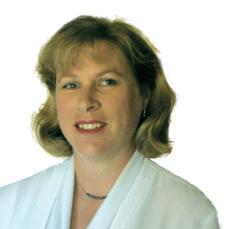
Catherine Parish @ home
During the recent holidays I went with my older children to see the movie “The Incredibles”, unsure of what to expect. I was pleasantly surprised to find it both entertaining and refreshingly insightful regarding current popular opinions about society. A successful legal action against Mr Incredible for saving a suicide victim who did not want to be saved leads to a series of complaints against various superheroes, and huge compensation payouts being made by an increasingly annoyed government. Mr Incredible is reduced to anonymity and 9 to 5 drudgery; but he is still trying to protect the helpless as far as he is able. Erstwhile superhero Elastigirl, now his wife, is still performing incredible contortions trying to
Family
is the future

make her family appear normal, to ‘fit in’ with a society in which their selfless acts of heroism are deemed too costly. The recurring theme is that modern society is apparently structured to glorify the mediocre, rather than allow people with special talents to reach their full potential. It rang dusty bells in my memory of Alexis de Tocqueville’s fascinating book ‘Democracy in America’. This prescient Frenchman writing in
the 1830’s as an outside observer of fledgling American democracy was of the opinion that while democracy has its benefits, when the notion of equality is taken to its extreme democracy can become a system governed by majority opinion where mediocrity and conformity are the expected norm, the risk being that absolutes such as natural justice, inalienable rights or even right and wrong, become subservient to public opinion and
Pray for your children, believe me, it works
Derek Boylen, a family studies graduate, writes a regular column on parenting for The Record
One of my favorite quotes would have to be John 10:10. Most often I think about it when I’m thinking about our sons Elijah, Isaiah and Caleb (Yes, Karen and I like Hebrew names!). I guess I think about it because (like almost every other parent in the world) we want our children to have fullness of life. It often occurs to me that Christ did not say, “I have come so that you may have life and have it to the full. Except for you parents, you miss out so your children can have life to the full.”
It amazes me the number of parents I meet who moan about how having children has meant that they have given up their lives. I don’t deny it. Having our boys has changed every facet of our life but it’s certainly not any the less full (and I don’t mean busy).
Christ calls all of us to fullness of life and shows us the path to it. If we really want our children to have fullness of life and to know how to go about it, then we need to model
it ourselves. Some things probably need qualifying at this stage.
Fullness of life in the Christian sense (what I’m talking about here) is somewhat different from the counterfeit fullness of life offered by the world.
Fullness of life is not getting our own way all the time and doing whatever we want to do regardless of the consequences. It doesn’t mean that we should be happy all the time either.
The Scriptures tell us that he has carved us on the palm of his hand (Isaiah 49:16) and that he knew our name before we were in the womb (Jeremiah 1:5).
As parents, uncles, aunts and friends, of families we are called to role model fullness of life for our children. Unfortunately, some parents see themselves as a life put on hold till the kids move out of home.
If that’s you, then evaluate your situation. How are you fulfilling Christ’s call to fullness of life as a parent? Know that you are not on your own.
God knew you from the beginning of time and he knows your children too. He yearns for both of you to have fullness of life.
The Scriptures tell us that he has carved us on the palm of his hand (Isaiah 49:16) and that he knew our name before we were in the womb (Jeremiah 1:5). Trust that your children aren’t some random lot in life.
They have been especially chosen and entrusted to you. Ask the Holy Spirit to come to the party. After all, he gave them to you. When you pray, share with God your frustrations and joys and ask for His help. Karen and I find it really helpful to pray for our children together.
Sometimes we do it before bed but occasionally we just do it spontaneously.
If you know someone with children don’t forget to affirm them. Let them know that this particular part of their vocation is important and valued.
Look for the good qualities in their children and affirm them. It’s most likely that those traits come from their parents and, as a parent, it is nice when people notice.
- Derek Boylenoften seem to devalue these special acts by continually perpetuating the message that “everyone is special”; the obvious corollary is that no-one is special. Naturally everyone has gifts, but peoples’ ability to recognise and value real greatness is something that is perhaps being lost, to our detriment.
its supporting legal system. Sound familiar? It is refreshing and reassuring to know that mainstream entertainment providers are starting to look at the problems of a society where ‘legal’ does not necessarily mean what is right and just. Spontaneous and extraordinary acts of goodness are more difficult to perform as society becomes more constrained by rules governing private behaviour. The subtle message that society sends can
That the family is the bulwark of society is something that is also finally being acknowledged, albeit grudgingly. In the movie it was as a family that the Incredibles succeeded against the plans of Syndrome, it was as a family that they fostered each other’s talents and applauded each other’s excellence – and their extraordinary abilities were not just for getting themselves ahead, but for the service (and the saving) of their fellowmen and the betterment of their society. It is in the Christian family that heroic virtue in imitation of Christ, the archetypal hero, is nurtured. Strong, muscular Christian virtue that holds to and fights for what is right against the odds and does not give in to fickle public opinion.
That is what we as Christians are called to do.
Teachers fight internet plagiarism
For students who wait till the last minute to start their school essays, plagiarism today doesn’t even require “cracking open an encyclopedia”, according to a report in the Christian Science Monitor.
“Need a paper on the Cuban Missile Crisis?” Done, for US$10 a page,” says the report. “Want it custom made? Add another $5 per page. Just go to sleep and it’ll be in your inbox by morning.”
The article says that since the internet became readily accessible to students in the 1990s, it has become in some ways the educator’s worst enemy. In secondary schools and universities alike, students are taking advantage of the fact that ready-made papers are only a few clicks away. An entire industry has sprung up to provide free homework or - at a price. Students can browse alphabetical lists of categories to find the paper of their choice. For US$136, a frantic high school student can download a 19-page paper on US Presidents.
Some sites are free of charge. The operators of one site say they now get 10,000 hits per day with 600,000 people signed up.
But teachers are fighting back with educators using internet search engines, and anti-plagiarism technology to beat the cheating. One low-tech way for teachers to fight plagiarism is to require students to carry out tasks in the classroom. Teachers simply ask students to write a few paragraphs, which they hand in immediately.
“But for suspicions that are harder to prove, many schools are turning to technological solutions like Turnitin. This on-line tool searches the internet as well as millions of publications for copied passages as short as eight words. It scans papers against material it has collected from professors to check papers against one another and see if any two students have plagiarised from the same site.” The service costs about 60 cents per student each school year.
At schools that haven’t invested in technology like Turnitin, teachers are developing their own strategies. In 31/2 years of teaching English at Brooklyn College, Damian Da Costa caught two to three students each year by searching for phrases with Google.
The Success of tradition
Spanish-based US journalist Robert Duncan has a one-word answer to stopping the spread of AIDS: Uganda. It's a word that should make those who propose the use of condoms as the main solution to the problem stop and look again.
The following is an edited version of the original.
Uganda is one of the few African countries where HIV prevalence rates are declining, and it is seen as a rare example of success in a continent which is facing a severe AIDS crisis.
Uganda’s policies are credited with having brought the prevalence rate down from higher than 30% in the early 90s to around 6% last year. Now, the government and the UN say that only 4.1% of adults have the virus.
The country is seen as having implemented a well-timed and successful public education campaign, reducing the numbers of people indulging in casual sex as well as significantly cutting the HIV prevalence rate.
A few more statistics, even though they seem to vary a bit (as statistics tend to do). Well, how about this: the number of pregnant women infected with HIV was 21.2 percent.
From the 1980s to today, that number has dropped spectacularly to in 2001 standing around 6.2%. How was this done?
Did the Bishops cave in and start passing out condoms? No.
Instead, the country opted for an “antiquated policy,” based on the “killjoy” policies of abstinence and fidelity. Sound familiar? You see,

there’s this funny thing about AIDS:
If you and your spouse are faithful to each other, your chances of getting AIDS are almost nil.
And, mind you, this has even been
recognised by medical authorities: Adding a new perspective to the ongoing debate over the best way to prevent AIDS in Africa, two British researchers say statistics prove
a national emphasis on less casual sex, not more condom use, explains the stunning decline in cases in Uganda. Their findings, published in the April 30 issue of Science, won’t end the ongoing battle over the roles of abstinence, monogamy and safer sex in AIDS prevention in Africa and elsewhere. But study coauthor Daniel Low-Beer hopes his work will help spread the details of Uganda’s success story.
“Uganda had one of the worst African AIDS epidemics (in the early 1990s), but it reduced HIV by 70 percent,” said Low-Beer, an epidemiologist at Cambridge University. The country’s progress is “the clearest example of behaviour and communication change reducing HIV.”
A Harvard study reported Ugandan adults are not having as much risky sex: of women 15 and older, those reporting many sexual partners dropped from 18.4 percent in 1989 to 2.5 percent in 2000.
The emphasis on abstinence in Uganda’s program is unique in Africa. In other nations with high HIV infections, such as Zimbabwe and Botswana, condoms have been promoted as the answer to ending the AIDS crisis.
In Botswana, 38 percent of pregnant women were HIV positive last year, contrasted with 6.2 percent of Ugandan women.
The Ugandan program was promoted by the King, the President and especially the President's wife as a return to traditional Ugandan values of chastity and fidelity instead of the promiscuity of the Western ‘sexual revolution’ which has caused so much physical and
family destruction around the world.
From a purely responsible, and much more inexpensive path, governments should look to Uganda as an example. Do they wish to continue pumping money into a system that promotes sexual promiscuity that comes equipped with higher social, medical and economic expenses? Or do they seriously wish to attack the problem at the root?
Sexual promiscuity doesn’t just bring AIDS. It also brings broken families and torn-up children. How do you measure that on a “social cost” yardstick?
Logic says that if a person doesn’t want to catch AIDS, there’s a simple solution. You play with fire, you get burnt. Money doesn’t need to be spent on more and more studies. The answer is centuries old: abstinence and fidelity. It’s time for the press to stop covering up the success of Uganda. It’s time the Church’s teaching was respected. Next time somebody tells you that to stop the spread of AIDS we just need to pass out more “rubberyplastic balloons,” I trust you will respond to them with just one little word: “Uganda.”
FOOTNOTE:
If you want a second little word it is “Thailand”. AIDS has killed nearly a million people in Thailand and left 300,000 children orphaned. During the mid 1990s, 150,000 new HIV infections were reported each year. Thailand’s Catholic Bishops launched a prevention campaign based on abstinence and fidelity. The Government now estimates the HIV infection rate at 20,000 a year.
New words you may not need to know
Neologisms
The English language is endlessly inventive. Here are some major new additions which are appearing in the world press. Not all of them will survive, but some of them deserve to. It’s up to you.
metrosexual: an urban male with a strong aesthetic sense who spends a great deal of time and money on his appearance and lifestyle.
stress puppy: a person who thrives on stress, yet complains about it constantly.
bridezilla: a bride-to-be who, while planning her wedding, becomes exceptionally selfish, greedy, and obnoxious.
mucus trooper: an employee with a cold or the flu who insists on showing up for work.
kitchen pass: permission from
one’s spouse to attend an event or go on an outing.
spinach cinema: movies that are not very exciting or interesting, but that one feels one must see because they are educational or otherwise uplifting.
stealth fat: a type of fat - known officially as trans fatty acids or trans fats - that doesn’t appear on food nutrition labels (also called phantom fat).
Source: www.wordspy.com (a web site devoted to “lexpionage”, the sleuthing of new words and phrases).
The scary reality of reality TV
Number of Australian applicants for Big Brother 2001 : 12,000
Number of applicants for Big
Brother 2004: 33,000
Number who will be selected: 12 or 14
Number who watched Big Brother Final

Eviction in 2003: 2.27 million
Number of applicants for Restaurant: 18,000
Number who were selected: 5
Number of couples who applied for
The Block: 9,000
Number who were selected: four couples
Number who watched The Block
Auction 2003: 3.11 million
Number who watched Australian idol final 2003 (10) 3.30 m
Length of casting process for reality
TV shows: two to three months
Ita criticises 'dumb' women's magazines
One of Australia’s leading woman publishers, lta Buttrose, has criticised today’s women’s magazines, branding them “half-witted” and claiming they seemed to think that women were stupid.
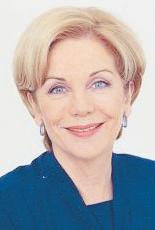
Ita Butrose
“The thing that worries me about women’s magazines, and most of them are experiencing a decline in circulation, is I think they underestimate the intelligence of the market - the readers are not dumb and that is a very wrong assumption to make,” Ms
Buttrose said while visiting Hobart to address a women’s luncheon in late 2004.
Hobart’s Saturday Mercury newspaper reported Ms Buttrose as saying.
“Even with relaxed reading, there’s a standard you need to achieve and I just cannot see how these welleducated women that we have in Australia today could possibly, on a regular basis, buy women’s magazines today, because a lot of the magazines are half witted - not all of them.”
Ms Buttrose also said that too many women thought they should be superwomen and she believed that relationships suffered be-cause men and women don’t really communicate any more.
Duelling with Darwin
Darwinism is far from gospel truth amongst scientists. Its gaps are being filled in by “intelligent design” theory, reports William West.
Do you believe in evolution? If so, you might be surprised to find that you are a member of a rapidly dwindling group. And if you think that everyone is suddenly turning to biblical creationism, you would be wrong. Although there once only seemed to be two answers to the question about the origin of species, in recent years a new theory has become popular among scientists who believe that Darwinian evolution has just too many holes in it.
Known as intelligent design theory, or simply ID, the new approach combines the best of both of the previous explanations of the development of life on planet earth and attempts to avoid the pitfalls of both. ID is spreading so fast that it has gained many enemies. This is mainly because it makes plain the need for a God, or at least a superhuman intelligence.
By some commentators ID is described as the modern scientific equivalent of the design argument for the existence of God. Its two main planks are, firstly, gaps in the fossil record which most Darwinists reluctantly acknowledge, and secondly, the amazing way in which highly complex biological systems work together. In a word, ID theorists argue that biological systems are so complex that they make man-made machines, like the motor car or the computer, look positively pedestrian by comparison. Unlike many creationists, ID theorists do not reject evolution, they simply draw attention to the fact that its workings, while far more limited than Darwinists would concede, present a compelling argument for the existence of a mind behind it all.
For those who would like to bone up on the basics of ID, you could start with the book Doubts About Darwin: A History of Intelligent Design by Thomas Woodward and Phillip E. Johnson or The Design Revolution: Answering the Toughest Questions About Intelligent Design by William Dembski and Charles Colson. A search on the internet will turn up many more.
ID theorists have had such an impact that even leading scientific organisations have been forced to take a position. They include bodies like the American Association for the Advancement of Science. Some groups are embracing ID with evangelistic fervour. For instance, at the University of California an Intelligent Design and Evolution Awareness (IDEA) Club has been established (http://acs.ucsd.edu/ ~idea/). One commentator on the club’s site, Casey Luskin, points out one of the reasons why intelligent design is proving so popular - because it does not require any shared religious beliefs in the way that creation science does:
“It makes no statements about the identity of the intelligent designer,” he says, “but merely says that intelligent action was involved at some point with the origins of various aspects of biological life.
“So we’re back to a mind. When Charles Darwin and his contemporaries were living - in fact pretty much up until Watson and Crick elucidated the structure of DNA, it was generally thought that living cells were made of something called protoplasm. Protoplasm was just a name given to the jello-like substance that seemed to be what cells were made of... Today we know that a single cell is not the product of a simple chemical reaction. Even the very smallest cell is filled with exquisitely precise molecular machinery, highly complex and interdependent, to the extent that, in most cases, if even one machine were to cease functioning, cell death would occur very soon thereafter.”
Many leading scientific and intellectual journals and magazines have been forced to acknowledge the escalating warfare within the scientific community. Natural History magazine, for instance, carried an extensive special report. In Britain, The Spectator magazine ran an article late last year (republished in The Australian’s Higher Education Supplement) pointing out that many people are now becoming Darwin doubters. Author Mary Wakefield started out by sharing her astonishment when she discovered that a friend - “a man who has more postgraduate degrees than I have GCSE’s - had actually confessed that he did not believe in evolution. She continued:
“Last Saturday at breakfast with my flatmates, there was a pause in conversation. ‘Hands up anyone
through his 1996 book Darwin’s Black Box: the Biochemical Challenge to Evolution. But he is not alone. The Spectator article noted that 100 prominent scientists, including Nobel prize nominees, have been listed by the Discovery Institute as opponents of Darwin.
who has doubts about Darwinism,’ I said. To my surprise all three - a teacher, a music agent and a playwright - slowly raised their arms. One had read a book about the inadequacies of Darwin - Michael Denton’s Evolution: A Theory in Crisis; another, a Christian, thought that Genesis was still the best explanation for the universe. The playwright blamed the doctrine of survival of the fittest for ‘capitalist misery and the oppression of the people’. Nearly 150 years after the publication of Charles Darwin’s Origin of Species, a taboo seems to be lifting.”
Wakefield says that until recently to question Darwinism was to admit to being “either a religious nut or just plain thick”. She acknowledged that for most of the late 20th Century Darwinism had seemed “indubitable”, even to those who “have as little real understanding of the theory as they do of setting the video-timer”.
But then came the ID theorists...
“Over the last few years they have had a staggering impact,” she wrote. “Just a few weeks ago, they persuaded an American publisher of biology textbooks to add a paragraph encouraging students to analyse theories other than Darwinism.
Over the past two years they have convinced the boards of education in Ohio, Michigan, West Virginia and Georgia to teach children about intelligent design. Indiana and Texas are keen to follow suit. They sponsor debates, set up research fellowships, publish books, distribute flyers and badges, and conduct polls, the latest of which shows that 71 per cent of adult Americans think that the evidence against Darwin should be taught in schools.
“Unlike the swivel-eyed creationists, ID supporters are very keen on scientific evidence. They accept that the earth was not created in six days and is billions of years old. They also concede Darwin’s theory of microevolution: that species may, over time, adapt to suit their environments. What intelligent design advocates deny is macroevolution: the idea that all life emerged from some common ancestor slowly wriggling around in primordial soup. If you study the biological world with an open mind, they say, you will see more evidence that each separate species was created by an intelligent designer.”
Michael Behe, in particular, has had a strong influence on public perceptions of evolution theory
While The Spectator article acknowledges that many, if not the majority, of scientists, still support the theory of evolution in one form or another, it makes a telling point about the opposition that some evolutionists have inspired by tying evolution to atheism. The article suggests that much of the opposition to mainstream evolution could have been avoided if it had not been used as ‘proof’ of the non-existence of God. In support of this position it quotes Kenneth Miller, a Darwinian scientist and a Christian.
In his book Finding Darwin’s God, Miller says: “Evolution may explain the existence of our most basic biological drives and desires but that does not tell us that it is always proper to act on them...
Those who ask from science a final argument, an ultimate proof, an unassailable position from which the issue of God may be decided will always be disappointed. As a scientist I claim no new proofs, no revolutionary data, no stunning insight into nature that can tip the balance in one direction or another. But I do claim that to a believer, even in the most traditional sense, evolutionary biology is not at all the obstacle we often believe it to be. In many respects evolution is the key to understanding our relationship with God.”
In other words, both ID and evolution are compatible with a belief in God. As to which is closer to the truth, stay tuned to this channel. But in future, anyone who wishes to address the question of the origins of life will at least have to be familiar with the theory of intelligent design.
William West is a freelance journalist based in Sydney. His email address is west@web29.com

